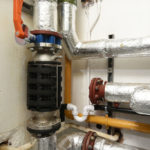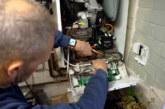Ensuring social housing heating systems are properly protected is crucial, not only to help improve system performance, but for the wider energy and cost savings that can be made too. Darran Burrage considers the role magnetic filtration can play in supporting central heating system health.
While heating and hot water is usually provided to residents living in social housing through either a central plant room or individual boilers, the problems that affect these different types of heating system are very similar. As a starting point, it’s important to understand what threat is posed and how this can best be treated to mitigate damage to the system and protect any investment that has been made.
Simply put, it’s corrosion that causes damage to pipework and boiler components, which means the system becomes less efficient and is more likely to break down. Corrosion occurs when water circulates through the system and the result is magnetite, which makes up 98% of system debris. However, magnetite particles are very small, measuring just 0.008mm in diameter, which makes capturing them difficult. It also means they can travel easily around a heating system, deposit in low flow areas such as heat exchangers, base boards and radiators, cause erosion in turbulent areas and clog up pumps.
Education the key to success
While there has undoubtedly been progress made in educating the sector about the importance of planned system maintenance, there are still a large proportion of heating systems left unprotected and therefore vulnerable to breakdown. Replacing a boiler, whether this is in a traditional home context or in a plant room, is an expensive exercise. Add to this the budget constraints that housing providers are under, coupled with the fact that the provision of heating and hot water is a basic requirement across the board, it’s imperative that the correct action is taken to protect system performance.
While specifying magnetic filtration from the start is the most effective way to ensure proper protection, solutions can also be retrofitted. Alongside the installation of a magnetic filter, we encourage installers to take a holistic best practice approach for maximum results.
The first step is to clean the system with a premium chemical cleaner, which will help dislodge any system debris that has built up and make it easier to collect. A system flush should then be carried out to properly clean the system and ensure it is free from magnetite. A magnetic filter is then installed to collect the sludge and it should be serviced once a year. A chemical inhibitor is added which helps protect against corrosion and limescale deposits, before a water test is carried out with options for both chemical and microbiological testing available.

Preventing boiler breakdown
Underbank House in Bacup, Lancashire was built in the late 1960s and comprises 16 studio, one- and two-bedroom retirement flats which are managed by Together Housing. Heating and hot water are provided via two boilers in a plant room but due to the age of the system, which had been installed during original construction, it was plagued by regular breakdowns.
With only an annual service in place and no proactive system maintenance, eventually both boilers completely failed. Budget was allocated to source two new, more modern and efficient boilers but given the investment being made, and keen to avoid a repeat of the previous problems, Repairs Team Co-ordinator, Matthew Pilling turned to ADEY.
“When the boilers failed we had to decommission the system and put temporary measures in place to ensure there was no disruption to heating and hot water,” comments Matthew. “It was May so not as critical as if it had been the winter but nevertheless, with elderly residents, it was essential we were able to solve the problem quickly. For those that needed them, we provided heaters and installed a free-standing cylinder that worked off an emersion heater and was plumbed into the pipework to maintain the hot water supply.”
Mark Pugmire from ADEY’s Commercial Division, worked closely with Matthew to install a MagnaClean DRX magnetic filter to protect not only the boilers, but also the system as a whole. The filter incorporates a specific magnetic belt containing high-performing neodymium magnets wrapped around a precision-engineered stainless steel case, to make servicing quick and easy. The belt is simply released and any black iron oxide sludge that has been collected is emptied via a drain valve.
Protection in practice
“The DRX provided a flexible installation option as it’s ideal for plant rooms where space is at a premium,” says Mark. “In discussions with Matthew we knew that simply fitting a filter wasn’t going to be enough so we also agreed an ongoing maintenance programme that would ensure the system was properly protected, reducing the chance of breakdown and extending the lifespan of the newly installed boilers.”
Before the filter was installed, the system was flushed and cleaned with ADEY’s MC3+ chemical cleaner. Once the DRX was in place, MC1+ chemical inhibitor was added to provide ongoing protection and help reduce the amount of magnetite circulating in the system. The system water is now also tested once a quarter to help spot any problems before they become critical. This also means the level of inhibitor can be checked and topped up if necessary.
“The problems we had highlighted that an annual service and water test, which always revealed an issue with the water quality, were not providing sufficient protection,” concludes Matthew. “Thanks to a proactive rather than reactive approach, we are now in a much stronger position. While it was far from an ideal situation, we’ve learnt from it and with ADEY’s help have markedly improved the water quality. Given the cost of replacing the boilers, protection is crucial and we’re delighted with the results. The system is working much more efficiently and breakdowns are a thing of the past.”
Darran Burrage is National Specification Director at ADEY









